Don't miss our flash to bang SALES!
Reflection on Life in a Japanese Internment Camp during WW2
 Question: Let me start, first of all, just so I get your name right. Shig.
Question: Let me start, first of all, just so I get your name right. Shig.
Answer: Shig.
Question: Honda?
Answer: Hond
Answer:
Question: S-H-I-G.
Answer: Correct.
Question: H-O-N-D-
Answer:
Answer: Correct.
Question: Now during — well, let’s start. I’ll back up a little bit because I want to learn a little bit of your history here, because I don’t know too much. You were where when the war was going on before being in the internment camp?
Answer: I was aware of what?
Question: Where were you living?
Answer: We were in Yakima Valley, in Wapato, and we were on a farm on an Indian reservation. I mean, we were leasing from the Indians. And the war broke out when we were in Wapato.
Question: And so how long had your family been in America?
Answer: Well, my father came to this country in 1916, I believe. My grandfather came in 1903. And he established a business in Yakima, and after the ’29 crash, why then he moved on and went to farming down in Wapato. My dad married and I was born in San Francisco. And then we lived in Los Angeles, California, most of the time when I was about nine years old. And then my dad and mom divorced and so I came up here to Wapato when I was ten. And at 14 is when the war broke out — 1941. So we were farming at that time.
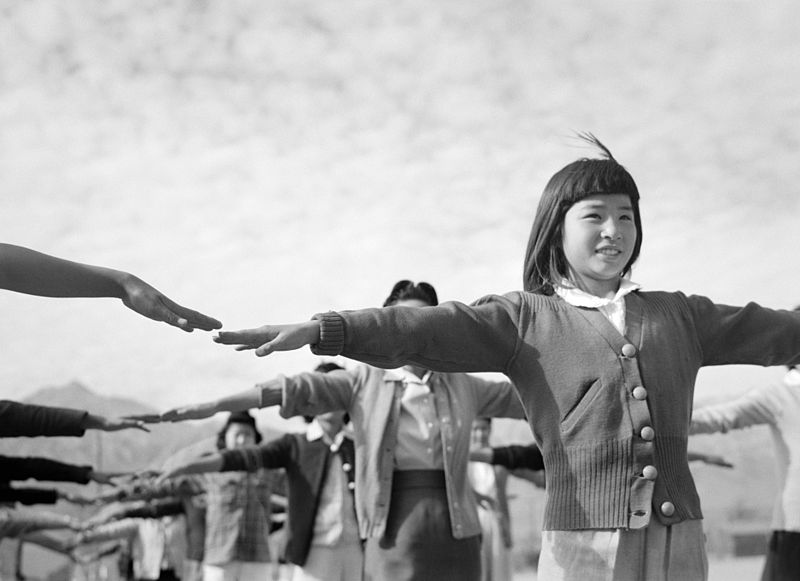 And being 14, we knew nothing about racism or anything like that. You know, we were not involved in that. We didn’t know anything about it. We’re — we’re backward people, farmers, you know. So we’re not aware of that until after the war broke out and all of a sudden we started seeing different — different changes in people, in friends and attitudes at school. And we were — we had a Japanese language school that we attended after our English school. So we went to a Japanese language school from about 3:30 until 5:30. Shortly after the war broke out, I can’t remember exact time. I think it’s probably about January, February, that somebody burned the school down. Japanese school. And that’s when we really started to find out. Some of my teacher’s attitudes started to change towards us. And so, like I said, we were unaware of all this prejudice, racism, like that.
And being 14, we knew nothing about racism or anything like that. You know, we were not involved in that. We didn’t know anything about it. We’re — we’re backward people, farmers, you know. So we’re not aware of that until after the war broke out and all of a sudden we started seeing different — different changes in people, in friends and attitudes at school. And we were — we had a Japanese language school that we attended after our English school. So we went to a Japanese language school from about 3:30 until 5:30. Shortly after the war broke out, I can’t remember exact time. I think it’s probably about January, February, that somebody burned the school down. Japanese school. And that’s when we really started to find out. Some of my teacher’s attitudes started to change towards us. And so, like I said, we were unaware of all this prejudice, racism, like that.
And then rumors were that they’re going to send us all to camp. And I says, why? Well, nobody had an answer, you know. All we knew, that in February my uncle came back. Of course at that time, of course, I was still — I didn’t even know where Pearl Harbor was. In fact I don’t think a lot of people knew where Pearl Harbor was.
Question: They didn’t.
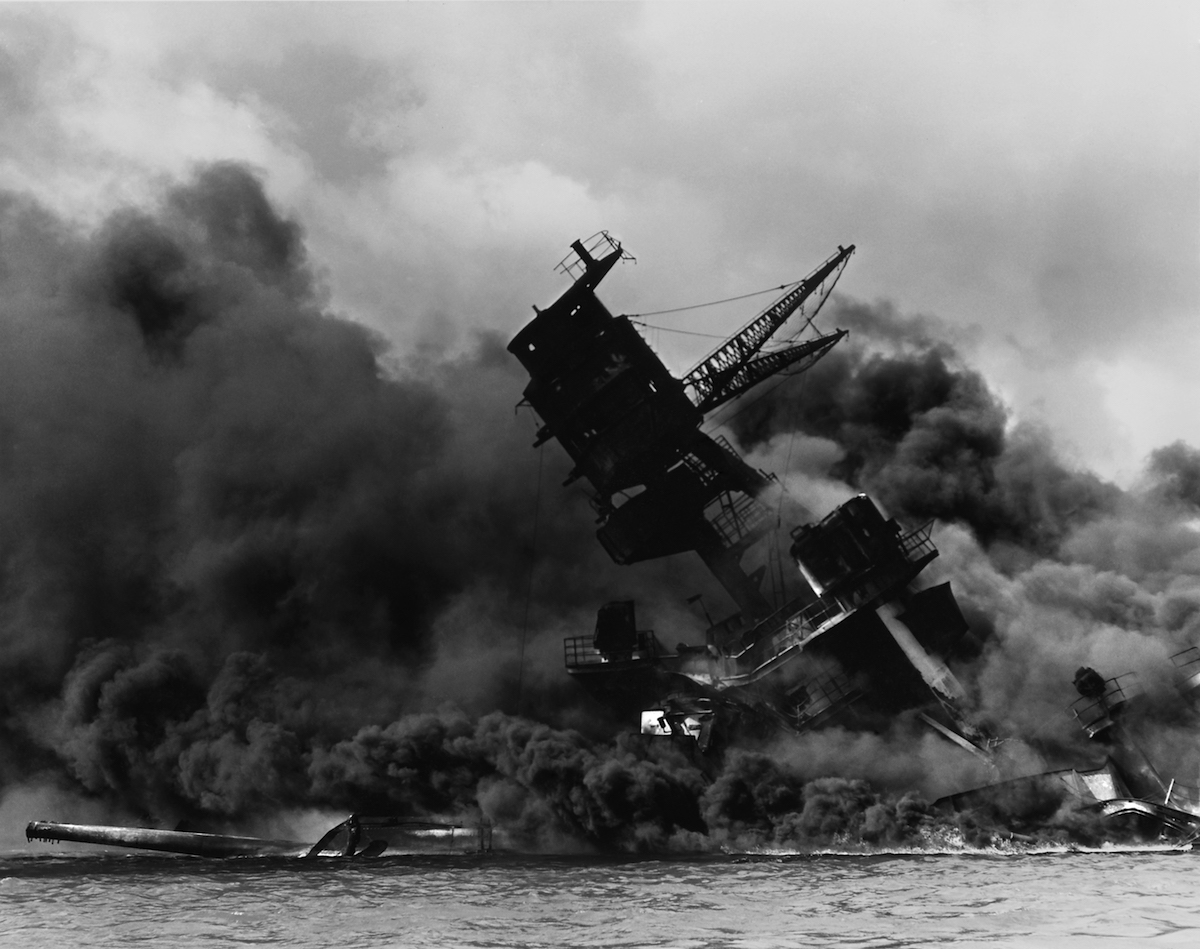 Answer: So December 7th, when we heard that, I’m going to back up a little bit. We were in Spokane at my aunt’s brother’s wedding, married on December 7th. And that night at the reception, I think it was at Ribpass Hotel — I’m not sure on that. But anyway, by about 10 o’clock when the reception was concluding, we couldn’t go home. The FBI surrounded the entire hotel and we were being detained at the hotel. So we were finally allowed to leave at 1 o’clock. And I’m still unaware of — I know that Japan had attacked us. Again, I don’t know where Pearl Harbor was.
Answer: So December 7th, when we heard that, I’m going to back up a little bit. We were in Spokane at my aunt’s brother’s wedding, married on December 7th. And that night at the reception, I think it was at Ribpass Hotel — I’m not sure on that. But anyway, by about 10 o’clock when the reception was concluding, we couldn’t go home. The FBI surrounded the entire hotel and we were being detained at the hotel. So we were finally allowed to leave at 1 o’clock. And I’m still unaware of — I know that Japan had attacked us. Again, I don’t know where Pearl Harbor was.
But then going forward, in February of ’42 was when Executive Order 9066 was signed, and that gave the authority to the Army to designate certain areas of the West Coast to evacuate foreign nationals. But they didn’t — they didn’t actually say Japanese. In fact there’s another Executive Order in March 9106, I believe. That established a wartime relocation authority, which was administered by the Army Command and General DeWitt was leader of that. And he is the one that designated that all Japanese persons of Japanese national be evacuated from the West Coast at these designated spots.
Well, we’re still not sure what’s going to happen, you know, but in March my uncle came back from town and he says, well, looks like we’re going to have to leave. You know, we still didn’t know where. All we knew is we had to pack and pack only the things we can carry. Clothes and suitcases. And all contraband. Anything metal, bicycles, cameras, of course guns, were all contraband, so they were all confiscated.
Question: Did they come to your house and confiscate them or you were supposed to turn them in?
Answer: You know something? I really don’t know whether we took them over to the certain place. I’m pretty sure we took them over in trucks, but I’m not — I don’t remember that.
Question: Because you’re just a young boy.
Answer: I was 14.
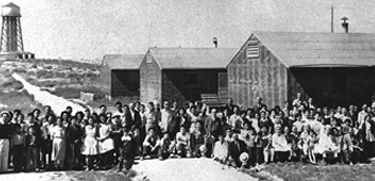 Question: Yeah.
Question: Yeah.
Answer: And unlike today’s 14, 15, we were just — I mean really ignorant about a lot of things, you know. So all I know is our radios and everything, we had to transport. Of course, while we — while we were on the farm we had this home and we built the house and we dug our well and in, right around February, March, March, April, finally found an Italian family that had come over and he was going to take over the lease. So that — that came about and in about April, why the peas and beans were starting to come out so I still worked on the farm, 50 cents a day. And then in May, got the final orders that we had to assemble at the train station. But then we had a curfew at that time. That says we had — we had to stay in — we couldn’t be out at a certain — certain time. There some people says that we could have left, but maybe earlier we could have. But how you going to leave a home and leave a farm? So we stuck it out to the end.
We had relatives in Spokane, like I said, my uncle married and moved to Spokane, and he didn’t have to evacuate. Pasco didn’t have to evacuate, but Kennewick did. And they’re right on the other side of the river, you know, that’s the designation, you see. There’s no military compounds or any kind of activity in the Yakima Valley, that’s all farming. Up in Spokane there’s the Farragut Naval Station. Spokane didn’t evacuate. And in Pasco, of course, nobody knew about it, but the Hanford project is right there. And they didn’t have to move. So see, they just — it seemed like anything east of the Columbia River at a certain point, west of Columbia River in Washington, had to evacuate. And Oregon had to evacuate. So my wife was in Hood River. She was 12 years old. She had to evacuate.
So come May, we had to assemble at the train station, again, like I said, and they transported us, and finally we went to place called North Portland Assembly Center, which was the exposition park, livestock exposition park. And so that’s where we assembled. My wife went to Pinedale, Californi
Answer: That’s right around Fresno area, I believe. If I’m going too fast for you —
Question: No, no, this is great.
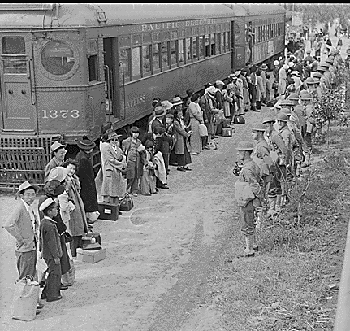 Answer: I’m trying to remember a lot of these things. But in May we went to Portland and we stayed there for three months. And this is all under one building. It’s a huge building. Exposition Center. And so all of our “apartments” were plywood, 4×8 plywood, 3/4″ plywood, standing up straight. No roof because we’re all under one big building so there’s no really roof over our apartments. And we had corridors and we had 8 x 8 apartments. And families had an 8 x — 8, 9, let’s see, 4, 8, 12, 8 x 12 so they can put maybe three cots in it. And we were lucky because we were outside of the stalls — the livestock stalls. All around the perimeter of that inside the building they had livestock stalls. And that’s where they had the apartments.
Answer: I’m trying to remember a lot of these things. But in May we went to Portland and we stayed there for three months. And this is all under one building. It’s a huge building. Exposition Center. And so all of our “apartments” were plywood, 4×8 plywood, 3/4″ plywood, standing up straight. No roof because we’re all under one big building so there’s no really roof over our apartments. And we had corridors and we had 8 x 8 apartments. And families had an 8 x — 8, 9, let’s see, 4, 8, 12, 8 x 12 so they can put maybe three cots in it. And we were lucky because we were outside of the stalls — the livestock stalls. All around the perimeter of that inside the building they had livestock stalls. And that’s where they had the apartments.
Question: So you were in the cattle barn, basically.
Answer: Yeah.
Question: Do you recall — I mean you recall this pretty well.
Answer: Hm-hmm.
Question: What were you thinking. Here’s a 14-year old boy. What are you thinking? Are you with your dad or your mom?
Answer: It was my grandp
Answer:
Question: Oh, you were with your grandpa, okay.
Answer: Yeah, I was with my grandparents and my uncles and aunt, because my father and mother were in Californi
Answer:
Question: So are they protecting you and saying, oh, this is just fun and games or did you really know what’s going on. I mean, were you afraid or —
Answer: Well, all we knew is we were in a, you know, they say this is an Assembly Center. Well, we didn’t know what an Assembly Center was until finally we heard that we were going to be moved to more of a permanent Relocation Center, they called it. Well within. As far as my feelings were concerned — it’s still kind of — it’s still foggy, you know. All I know is we work hard on the farm. I mean, on the farm, there’s no such thing as child labor or anything like that. We had to work. It’s a family cooperation and so my day starts at 5 o’clock in the morning and then after school, and going to school, after Japanese language school, then come home, do our chores morning and night and then study and then get in bed, maybe about 10 o’clock or something like that. Then you start all over, 5 o’clock in the morning again. So, to us, that change — it was kind of mixed feelings. No more getting up at 5 o’clock in the morning. And we didn’t have running water, hot water or electricity. In camp we had all that. We had communal — communal shower. And we had a lot of — we started making a lot of friends. You know, we never saw so many Japanese people assembled in one place — so many — such a place. It was a kind of a novel idea for us. But still the fact remains — all four corners of this camp; they had these guard nests, you know. Big 50 caliber machine guns. And so we — we still think it’s a novelty anyway. At that time I — we were told that we were being sent here to — so that we were being protected from the white community. So our question at that time was why are the guns pointed at us? You know, it didn’t make any sense. So anyway we stayed there in North Portland for three months.
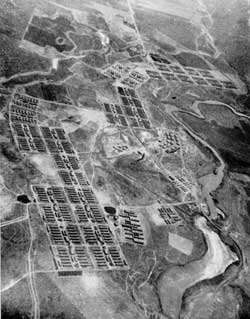 I believe that there was about 16 Assembly Centers that was built all around the United States. And like I said, my wife went to Pinedale, my dad went to Pomona Fairgrounds, and I believe up here in Puyallup, there’s a Harmony — Camp Harmony they called it. People in Seattle went there. And we were pretty much divided, although family wasn’t divided. At first, in the beginning, right after Pearl Harbor, all of the leaders of the community, the fathers and grandfathers who were considered leaders of activities. Lot of them were rounded up and taken to prisons as wartime — it’s a wartime prison. They were still afraid of all of this espionage and all this. And basically we were told that we were being segregated away from our community because of the fear of espionage, Fifth Column, you know, in those day they called us the Fifth Column. Not us, they called it the Fifth Column. And so. Well, anyway, like I said. I think there were about 16 Assembly Centers.
I believe that there was about 16 Assembly Centers that was built all around the United States. And like I said, my wife went to Pinedale, my dad went to Pomona Fairgrounds, and I believe up here in Puyallup, there’s a Harmony — Camp Harmony they called it. People in Seattle went there. And we were pretty much divided, although family wasn’t divided. At first, in the beginning, right after Pearl Harbor, all of the leaders of the community, the fathers and grandfathers who were considered leaders of activities. Lot of them were rounded up and taken to prisons as wartime — it’s a wartime prison. They were still afraid of all of this espionage and all this. And basically we were told that we were being segregated away from our community because of the fear of espionage, Fifth Column, you know, in those day they called us the Fifth Column. Not us, they called it the Fifth Column. And so. Well, anyway, like I said. I think there were about 16 Assembly Centers.
There were ten permanent Relocation Centers that we call them. And so from August, end of August, we were transported to Harp Mountain, Wyoming, which we didn’t know where that was. Of course, our blinds, everything had to be — we couldn’t see out. We’re not supposed to see out. And where we were going or anything like that. So when we got to this place called Harp Mountain, that was in August so it was pretty — pretty warm, you know, and desert. And then all kinds of rumors were starting to fly. That the rattlesnakes were all over the place, scorpions are all over the place, you can’t – you got to watch yourself. You get too close to the fence you’re going to get shot. You know, so all kinds of rumors. Rattle snakes and scorpions were not a rumor, they were there. But the rumors started to build up. And so we got pretty apprehensive about this whole situation.
Question: Are you aware enough at this point to — I mean, you’re starting to understand prejudice. Are you aware enough to be angry at what’s happening or is this still —
Answer: I was getting angry. I didn’t like the idea that we were forced into these camps, into these barracks, communal baths. Mess halls. And the main thing was this barbed wire all around the perimeter. And guard towers. And I was aware enough by then that there was such thing as concentration camps, although we never heard about Auschwitz or anything like that until after 1945, which I thank God we didn’t know about that. (laughs) We would have died in fear. We still wouldn’t believe that such a thing could happen here anyway. But, yeah, I didn’t like it at all. As far as school is concerned, my attitude about going to school or anything — it just — it just – to me it didn’t mean anything anymore. Rumors still flying that we were going to be sent out back to Japan. And in fact the matter — I think it was around ’43 — the government sent out a questionnaire. It was called — it was an illegal questionnaire. I’m not totally familiar with it. It’s only one thing about it was that we found out that the government asks. I was too young then, but some of our older group, you know, that were 18 and up. They were asked question, will you be loyal to the United States government and fight for the United States, or will you be loyal to the Emperor of Japan and things like this, you know, while we were in camp. Those who answered, and I don’t know the exact questions, but, are you going to be loyal to United States, you answered no. Will you fight for the United States, no. And if you answered no, no, then you were immediately classified as an alien enemy and therefore they rounded up all of those people who answered no, no, and put them in Tulle Lake. And they called that a Segregation Camp. And in other words, it was more or less for dissident people, they called them. And my wife was there in Tulle Lake. So they — I don’t know exactly how many, maybe less than a thousand people. I don’t know how many people were transported or transferred to Tulle Lake, and they took that even number of people out of Tulle Lake to make room for them, so some of the Tulle Lake people came to Harp Mountain and things like that. It was — it was total chaos. Then there was quite a few riots in Tulle Lake and then there was a — a group in Harp Mountain that — they were willing to — to fight, to go in the Army and fight, but not under the conditions that we were in camp. So they said no. We’re willing to go fight, but not as long as you keep us here in camp. And that was their contention. So they were all arrested — I think there was 30-some of them. There was a big trial and like that that went on, and they were all convicted. And I know couple friends of mine that was in among that group.
Question: So they said, yes, we’ll go fight for the US Army —
Answer: Well, they didn’t exactly say that. Yeah, we’ll go, but deep down, they were willing to go because we were all loyal Americans. But when the government puts us behind barbed wires in a concentration camp, they felt that it’s not fair to draft them right out of camp. And to go and fight. But there was — you probably heard Hawaiian contingent that formed the 442. And many, many Nisei joined the 442 right out of camp, and I lost a couple of close friends of mine. They were in school. They — they went and they were killed in Italy. But they went because they wanted to prove to the US government that they were loyal Americans. Because they put us in camp thinking that we were enemies. And so basically the 442 was formed to show the people of the United States that we were loyal American citizens. But there were a few of those that felt otherwise. They were willing to go, but not under these conditions. So that was quite a program. In fact of matter, that argument was still going on. Those who are loyal felt that these guys that stayed back were more like — not so much traitor sort of thing, but there was that difference. Loyal, these are loyal, these went, these didn’t. And so that — that argument, or not argument, but that issue is still ongoing yet, even though it’s been resolved because all of those who were released. And Justice Department says that they were — unfairly imprisoned. So, and in other camps there were riots. Now there’s another factor in it. They called Kibei. There’s another — see, there’s Issei, which are fathers and grandfathers, born in Japan. Nisei, us, were born here. Kibei were born here but raised in Japan. Okay, so in a kind of well, in a way that Nisei and the Kibei just didn’t quite make it, you know, see eye to eye, because the Kibei felt they were loyal to the Japanese. So, but they always called us traitors, you know.
Question: Traitors to Japan?
Answer: Japan. They felt that they were Japanese. They weren’t; they were born here.
Question: So you have the Kibei calling you traitors, and you have the US government not calling you traitors but putting you in these camps.
Answer: Well, that was because of — we finally ended up saying that, basically, this is wartime hysteri
Answer: A lot of people — many, most of the population on the West Coast — they were in great fear of war; in fact there was rumors of Japan invading the West Coast, something like that. And in fact of matter, there was a submarine that took a few shots off Santa Barbara coast. (laughs) Those kind of things – the people were really panicking. And then when their — their sons go overseas and hear all of these, you know, all the fatalities. Of course, naturally, they’re going to look at us Japs as enemies. And so we had to kind of swing, roll with it. So in 1944 — is there any questions?
Question: Well, that had to be hard. I mean, I can’t imagine that, because here, you’re neighbors, you worked hard, you’re a person, and the war starts and like you said, your teachers changed their attitude towards you.
Answer: Yeah, yeah. In fact of the matter — Where were we.
Question: Talking about the change — the fact that here were these people that were your neighbors and friends and all of a sudden you get your education, and for instance, teachers changing their attitude towards you. That must have been —
Answer: Yeah, it was. Like I said, even some of our teachers changed. Not all, but some of them. In fact the matter, I was kicked out of school just by walking over a chair. (laughs) That was it, you know. All I did was just walk on top of a chair and get on the other side, now I’m kicked out of school. Well, that — my aunt took me back the next day.
Question: Did you face verbal prejudice? I mean did you get taunting from kids that might not have known what they were saying, but —
Answer: I really don’t — I really don’t remember any verbal taunts that I heard personally. but you read about it. And you see movies of it.
Question: What did your — what did your grandpa think about all this? How did he — how did he explain all of this to you, or did he?
Answer: He never said anything. He lost the farm, and I would have to say deep down he was very bitter. The one person that I know was very bitter was my wife’s father. He was in the US Navy. He retired from US Navy. And he was sent to camp. And he lost part of his farm in Hood River. So when it comes to bitterness, he was bitter. He was retired, like I said, Navy. And for him to have to go and for him to be questioned about his loyalty is something that he couldn’t take. I would imagine. In fact the matter, the only — there wasn’t really what you call verbal animosity toward anybody from us to outside except (laughs) General DeWitt. He was the man that was behind sending us off. In fact, it’s a funny thing. I don’t know if this — lot of people probably don’t know this, but people — there’s some very influential people in California that was behind evacuating us. Get us out of here. And one of them was the Supreme Court Justice. He became the Supreme Court Justice. Another one was a major newspaper editor. And there were quite a few influential people in office — political office — that formed a group and got — got to President Roosevelt. I understand that President Roosevelt didn’t want to do this. He was reluctant to sign that Executive Order. But because of the hysteria, he had no choice. A lot of these came out in books that was written all about before and after Pearl Harbor and things like that. And I read quite a few of them. Now whether they’re factual or not, I don’t know. All I know is they’re history. And they do relate to facts, Congressional records. And so, no, as far as animosity is concerned, I personally never had anybody come up and really spit at me or anything like that, no.
Question: Why do you think that General DeWitt chose to change the order?
Answer: Well, he’s very famous for making one statement: “Once a Jap, always a Jap.” He made that statement. And so we were pretty much, knowing that he’s — he’s the commander of the western — the western Army. I guess he was the target.
Question: So it was one man’s prejudice, basically.
Answer: Well, it only takes one man, if you’re powerful enough.
Question: So that would explain why we didn’t inter Germans?
Answer: Yeah, that’s one of the things that I never could understand. One of our — very good friends of ours, name’s Petersen’s, and I’ll never forget him. And young boy, Harold, we were buddies. And they used to come over and they used to harvest with us and they were real nice friends. German family. Italian family took over our farm. So the question always came up in my mind, why. Why did we be selected? Well, naturally, Japan is the one that bombed Pearl Harbor. Germany never declared war on us, or Italy never declared war on us. We declared war on the axis. But there’s a lot of little things that I don’t know about, you know.
Question: When you were a child, did you think of yourself as Japanese or American?
Answer: I’ve always been an American.
Question: That’s what I thought.
Answer: Yeah, I went to Japanese school, I learned the Japanese language, and at that time I was very influential in — fluent, I should say, in language. I could read and write and speak. So right after I — I became 18, I volunteered to go to the military intelligence language school in Presidio, because I was fluent, and I thought well, after the war I might be of some help. Or even — even to go over somewhere. One of my friend, a very dear friend of mine — he’s deceased now, but he went over as interpreter during the war in the Pacific. But I was too small. I was underage — underweight. So they didn’t want me. So I says, well, if you don’t want me, then the heck with you, you know. So I didn’t — I didn’t go in. By the time the Korean War came on, I had two — two children; I was married in ’50.
One of the things I keep — I keep talking about while I was in camp. Just before I came out of camp, a friend of mine and I — we used to play tennis quite a bit together. We wanted to go out to Cody to play tennis. We wanted a hamburger and a Coke. We were dying for a hamburger and a Coke. So we got a pass and we went to Cody. But before we went, the mess hall — the chef said I’m going to make you a rice ball. I said I don’t want a rice ball. I’m going to go into Cody and get a hamburger and a Coke. He said I’m still going to make you a rice ball. I guess he knew something I didn’t. Because when we got into Cody, before we — well, we played tennis and then we went to a restaurant. We started walking down and there wasn’t a place that didn’t have a “No Japs Served” — “No Japs Wanted”. We couldn’t buy a hamburger and Coke. (laughs)
Question: What’s the feeling of that? I mean, when you saw those signs?
Answer: That’s when it really hit me about racism. Cause up until now I figured well, the government’s afraid we’re spies and they put us in camp because of hysteria, you know, worried about this and that. But when you really get down to racism, that’s when I first hit me. When I saw those signs that says “No Japs Served”. And of course, in Los Angeles, again, I’ll go back up. We’re from a small town, a farming town. We’re not exposed to this. But in Los Angeles, it was terrible. “Japs go home”. The Chinese were wearing signs, “I’m Chinese”. They were being mistaken for Japanese and they were getting beat up. There’s gangs roaming all over East Los Angeles that were ganging up on Orientals. There was an awful lot of violence down there. We didn’t encounter that. So I guess you might say we were fortunate. But that’s — afterwards I saw all the things that happened in the news reels and magazines and some of the things — the pictures that you see about Los Angeles. I figured we were pretty fortunate that we were in a small town and that part of the event never really totally reached us. Unless there were incidences that I’m not — I don’t know about. Other than that, no.
I came out of camp in 1944 because my uncle leased a farm in Spokane and so we decided — I wanted to get out of camp — I’d been wanting to get out of camp. I hated it. So when I got the opportunity to get a pass to go out, I took the first opportunity. We just took off. That was in ’44. I worked on the farm then and instead of going back, I had a seasonal pass. Before going back I started high school. I wanted to finish high school outside of camp. Because I knew that camp wasn’t going to be there. So I went to a little high school in East Spokane. I was one nervous boy. I didn’t know how I was going to be treated. It’s an alI white school. And I was so nervous that my eyes twitched for two weeks. I couldn’t stop twitching. And after that, why then I was being accepted. And they were also from small town, farming people, and they — they weren’t into all of that violence and so they accepted me real nicely and so I was able to weather that. And in December, the government wrote me a letter and in short, don’t come back. (Laughs) In other words, they said that all seasonal passes are being revoked and that you are no longer required to come back.
Question: To the camp.
Answer: To camp.
Question: Let me hold that thought for a second; I’ve got to switch tapes here.
(Courtesy of WWII Voices in the Classroom, www.wwiihistoryclass.com)
To learn more about this period of time here are a few recommendations. Or shop through our Amazon affiliate link below and help sustain stories on The Frontlines. Thank you!
Popular Products
-

Jumping Is Therapy
Price range: $19.50 through $28.00 Select options This product has multiple variants. The options may be chosen on the product page -

Flying Wolf Hoodie
Price range: $39.50 through $47.50 Select options This product has multiple variants. The options may be chosen on the product page -

Warrant Officer (Beret version)
Price range: $19.50 through $28.00 Select options This product has multiple variants. The options may be chosen on the product page -

Navy Rescue Swimmers Est. 1971 Hoodie
Price range: $39.50 through $47.50 Select options This product has multiple variants. The options may be chosen on the product page




